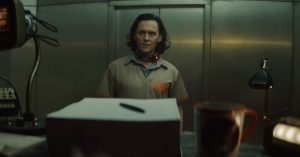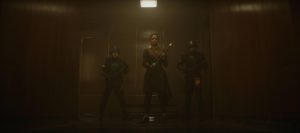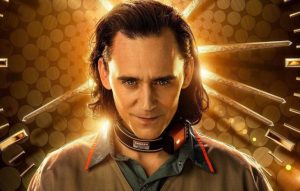SPOILERS FOR LOKI AHEAD!
Dear everyone who complained (sometimes with legitimate reason, to be fair) that it took forever for things to happen in the Marvel Disney+ shows, and that what did happen had no immediate effect on the movies – are you happy now? Because we’re only two episodes into Loki, and the entire duration of the Sacred Timeline, from its highly classified beginnings in the ancient past to its conclusion in the far-distant future, just got carpet-bombed into oblivion, causing gods only know how many new timelines to emerge at once, probably irrevocably altering the landscape of the Marvel Cinematic Universe. You all kept asking for a Multiverse of Madness; well, I think you just got one.

But I think the biggest testament to the strength of the writing and direction behind Loki (shoutout to Michael Waldron and Kate Herron, respectively) is that, in just two episodes, we already care enough about many of the characters in the Time Variance Authority that we can empathize with them as their entire life’s work, the preservation of the Sacred Timeline, comes crashing down around them. That empathy will never translate into sympathy for the institution itself, which is a mechanism designed with the sole intent and purpose of eradicating free will from the universe, but I feel for the people there: perhaps because I genuinely believe they are people, not beings called into existence by the Time-Keepers.
That said, I don’t doubt that there’s a good and probably sympathetic reason behind why the series’ current villain, a rogue Loki variant who for the purposes of simplification I will be referring to as Lady Loki (Sophia Di Martino), chose to obliterate the Sacred Timeline, rendering it no longer sacred nor singular. I can definitely appreciate the poetic irony in her using the TVA’s own technology to undo all of their work in an instant, dropping hundreds of volatile “reset charges” into an equivalent number of random points on the Timeline. And that’s what leads me to believe she’s doing what she does for a reason, something beyond an innate desire to see the world burn: because she seems to have purposefully singled out the TVA for her vengeance.
Is she really Lady Loki, though? She only reveals herself in the episode’s final minutes, and is never named. When Loki (Tom Hiddleston) addresses her as a Loki, she flinches and says she doesn’t want to be called that – but at the same time, goes along with his assertion that she is him, and even remarks that it’s the other way around; he is her. But given the fact that Di Martino bears almost no discernible resemblance to Hiddleston, and that the hairstyling team chose to accentuate that by giving her short blond hair in contrast to his long black locks, the only visual clue she offers for why we should be calling her Lady Loki is her golden tiara, which sports a single, rather unimpressive, devil’s horn – the other having been rudely hewn off.
I know it sounds bizarre to nitpick what seems so obvious, and it’s very likely that Sophia Di Martino is playing Lady Loki, but this series keeps reminding us not to take anything at face value, so I feel I’d be doing it a disservice if I didn’t…well, question everything. A prime example of this is the matter of the Time-Keepers, the trio of mysterious alien deities who supposedly rule over the TVA. Mobius M. Mobius (Owen Wilson) admits in this episode that he’s never actually met them, and Judge Ravonna Renslayer (Gugu Mbatha-Raw) once again coyly avoids a question about where they actually are and what they’re doing. Renslayer is conveniently the only person allowed to speak with the Time-Keepers, although she’d be a lot more convincing if she ever had anything to report from them except that they’re busy.

Even Mobius is starting to ask questions – although he’s more interested in why Renslayer apparently has another analyst secretly working for her on the side, than in the identities of the space lizards whom he still believes created him. Remember what I said last week? Loki’s mere presence in the TVA, his unpredictable nature, his critical thinking skills, his knowledge of the outside world, all pose a threat to the organization’s ability to demand blind subservience from its workers by telling them they have no purpose outside protecting the Timeline. He’s rubbing off on his co-workers, instilling the flame of rebellion in the very heart of this violent system, and they don’t even realize it yet.
Whoever actually runs the TVA definitely realizes it, however, and that’s why Renslayer is so intent on shutting down Mobius and Loki’s operation. I think that’s even why Miss Minutes (voiced by Tara Strong) herself comes down to Loki’s office cubicle to keep an eye on the God of Mischief, prompting a hilarious scene in which Loki tries to swat the talking timepiece with one of Mobius’ magazines about jet-skiing in the early 1990’s. Someone at the top knows how dangerous Loki is, and wants him gone before he corrodes the foundations and brings the whole structure tumbling down. I know it’s you, Kang.
But in an awkward turn of events, it’s Loki who ultimately figures out that the Variant has been hiding in apocalyptic events and natural disasters throughout history as a way of masking their trace on the timeline (an absurdly clever reveal that gave me shades of Connie Willis’ Passage: brilliant novel, highly recommend), and it’s Loki who warns the TVA agents about duplication-casting, a power which Lady Loki later uses against the agents (not to be too much of an Agents Of S.H.I.E.L.D. nerd, but Lady Loki’s ability to transfer her consciousness from one person to another, using human bodies like stepping-stones, reminded me of the S.H.I.E.L.D. villain, Izel). My point is that Loki is actually a huge asset to the TVA.
And Loki knows it. So at the end of the episode, when he’s given the opportunity to stick around with the TVA or follow his own Variant into a time-portal, he chooses the latter – essentially removing himself from the board, rejecting the TVA’s attempts to turn him into a pawn. What he’ll do next depends on where and when he emerges from the portal, but that’s the beauty of it: even he doesn’t know that information! He’s just causing chaos because it’s what he does, because he’s a trickster god.

There’s a scene in this week’s episode where Loki is reading through a case file on Ragnarok, which he helped bring about. As Natalie Holt’s excellent score shifts to a somber tone and brings in the sounds of Scandinavian instruments, the camera closes in on Loki’s intense blue eyes. What’s he thinking, as he reads about the thousands of Asgardian lives lost that day? Is there grief there? Vindication? A little bit of both? What makes it so chilling is that we don’t – and may never – really know.
Episode Rating: 9.5/10






